Summary
For most of our clients, their children’s future is the main issue. Therefore, it is crucial for those who plan to get a Portugal residence permit to determine where their children will study in advance. Sometimes this can be the deciding factor for moving.
Portugal is a delightful place to raise children. It is sunny, warm and surrounded by the ocean in the west to the mountains in the east. Young Portuguese residents get access to European preschool education. They learn communication, literacy, counting and foreign languages through active play.
After graduating from the Portuguese kindergarten, the children are fully prepared for school: they can write, read and solve simple mathematical problems.
See how the preschool education system works in Portugal, where the best kindergartens are, and what children do there.
How the system of preschool childcare works in Portugal
Portuguese kindergartens accept babies from four months to five years old. The goal is to prepare the child for school.
Age groups in Portuguese preschools:
-
nursery — 4 to 12 months, 1 to 3 years;
-
kindergarten, preschool — 3 to 5 years.
Children learn to distinguish colours, name objects and animals, and express their desires and emotions.
In groups for babies up to a year old, they mainly take care of children, play, and spend time in the fresh air. Children older than a year attend music, sports and developmental classes.
Not every kindergarten has nursery or babysitting groups: most are private.
In the preschool group , children from three years old are taught to read, write, count and draw. In addition, children play sports games, engage in creative activities, and go on excursions. The preschool group forms the communication skills of the child and fully prepares him for school.
There are public and private kindergartens. Education in public and private kindergartens do not fundamentally differ: the preschool education system in Portugal has professional uniform standards.
In kindergarten, daily education duration is five mandatory hours for children’s social, cognitive, psychomotor, and moral development. In any kindergarten, they carefully approach safety, the quality of education, and educators' qualifications.
State preschool institutions are free. They are under the care of the social service. However, they have a limited number of places, so priority is given to families in disadvantaged social positions — low-income families, children of young parents, or children with physical disabilities.
Almost half of the Portuguese children attend private kindergartens because there are not enough places in public kindergartens.
Differences between public and private kindergartens in Portugal
Common features of Portuguese kindergartens
When choosing a kindergarten, proximity to home, price, and positive recommendations matter. There are other important rules that preschools in Portugal follow.
Staff. All kindergarten teachers received higher education. They know how to act during tantrums or with naughty children. They know how to get involved in games, put them to bed and feed the kids. There are enough staff in the kindergartens to pay attention to each kid.
Teachers take into account the individuality and mood of the child. As a result, they know how to find an approach for those who need more attention or care.
Space is critical because a child spends up to eight hours a day there. As a result, rooms in kindergartens are bright and spacious, alongside places for recreation and games.
Rules. Portuguese kindergartens have a convenient schedule: children have enough free time for fun with their peers.
Nutrition. In kindergartens, food is prepared in their kitchen. The chef takes into account the nutritional needs of each child. For example, if a child is allergic to milk, his food will be cooked separately.
Children learn table manners like using cutlery, chewing slowly, taking breaks, and politeness. Here, children are not forced to eat up all the food or eat faster.
Safety. Kindergarten staff and parents are required to follow the basic rules. These include the security of the premises, playgrounds, safety of food and how employees should act in emergencies. Parents are also introduced to them when choosing a kindergarten.
Rituals include study visits, parties, and city tours that bring children together. Additionally, parents are invited to concerts and parties.
Daytime sleep is not organised in every kindergarten. At the same time, children under six need rest, even if they just lie in bed.
Best kindergartens in Portugal
The best Portuguese preschool childcare and nurseries are organised at international schools. Kindergarten preparatory groups for children from three to five years old are available at every school, and nursery groups offer only a few.
International schools use curricula from the US, UK, France and Germany. In addition, many educational programs follow the International Baccalaureate (IB), which focuses on teaching critical and independent thinking and logic and attention from a very young age.
International schools are located mainly in Lisbon, Porto and the Algarve. Children of around 30 nationalities study there.
Five best preschools in Portugal
1. Nursery and kindergarten at St. Peter’s International School
-
Location — Palmela
-
Age of children — 4 months to 5 years
-
Language of study — English, Portuguese
The kindergarten is committed to the idea that the first 36 months are crucial for a child’s future development. Therefore, it has a department of child psychology. Comfortable furniture, colourful books, and toys are specially designed for learning.
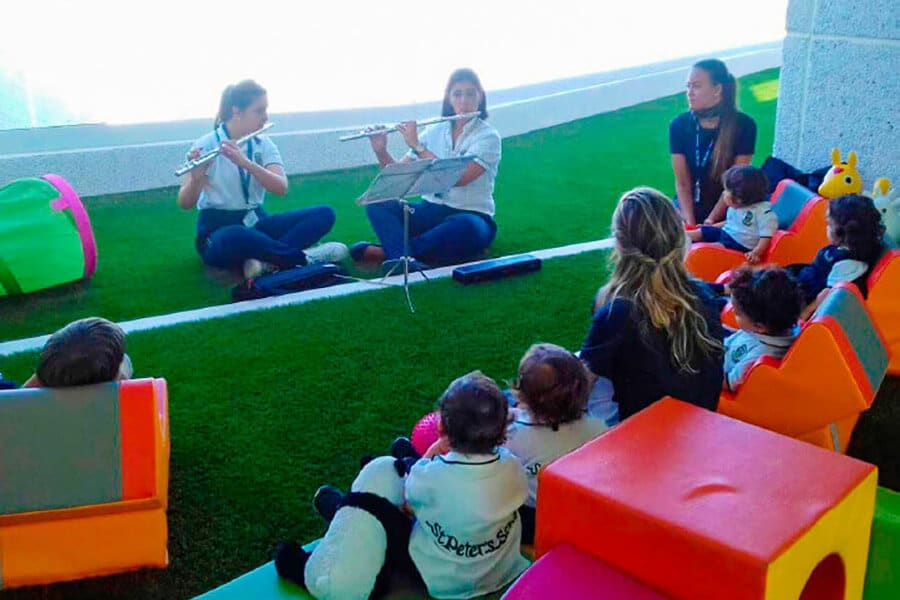
Kindergarten for children of 4 months to 5 years at St. Peter’s International School Source
The kindergarten has its theatre, sports grounds, and climbing wall. Each child receives a curator who helps to adapt to new knowledge and the team.
Educational subjects: Speaking, Literacy, Mathematics, Learning the world, Drawing and painting, Design, Singing, Acting, Playing musical instruments, Dancing, Communication, Swimming, Rugby, Football, Figure skating, Tennis, Basketball, Judo, Gymnastics, Yoga.
2. Nursery and kindergarten at Astoria International School
-
Location — Lisbon
-
Age of children — 4 months to 5 years
-
Language of study — English, Portuguese
The kindergarten focuses on learning languages, developing the child's unique personality, and the ability to learn and apply knowledge in life. In addition, children learn social and communication skills: friendship, solidarity, mutual assistance, and freedom of expression.
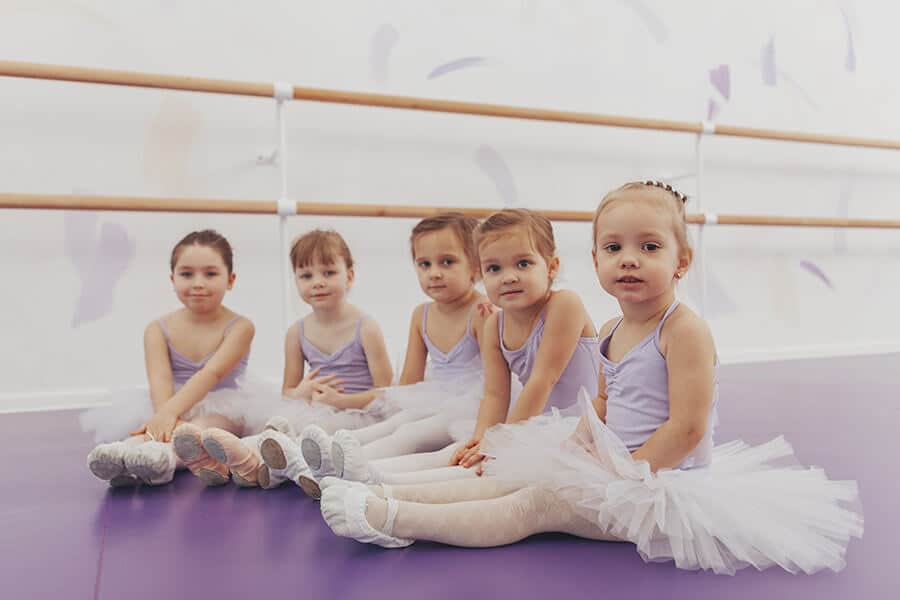
Kindergarten for children from four months to five years old at Astoria International School. Ballet classes begin for children from one year old and take place 2 times a week for 30 minutes
Cognitive processes such as logical thinking, understanding, deduction and memory are developed through play, creativity and theatrical performances.
Educational subjects include: Literacy, Reading, Mathematics, Logic, Music, Ballet, Drawing, Theatre, Football, Karate, Gardening, Cooking.
3. Nursery and kindergarten at International Sharing School
-
Location — The territory of Tagus Park in Lisbon and Madeira Island
-
Age of children — 4 months to 5 years
-
Language of study — English
The school and kindergarten follow the International Baccalaureate (IB), which focuses on teaching critical and independent thinking and logic and curiosity.
Educational subjects include: Writing, Numeracy, Reading, Chess, Singing, Ballet, Hip-hop, Tennis, Football, Judo, Karate, Taekwondo, Swimming, Horse riding, Horse riding.
Foreign languages: German, Spanish, French, Chinese, Italian, Russian.
4. Toddlers daycare at St John’s School
-
Location — Lisbon
-
Age of children — 4 months to 5 years
-
Language of study — English
The kindergarten follows the British education system and the Early Years Foundation Stage (EYFS) standards. A supportive environment is created for children to develop their intellectual, behavioural, emotional and physical skills. Educators take into account the different speeds of an individual's development.
Educational subjects include: Personal, social and emotional development; Communication; Language and literacy; Counting and numeracy; Logic and reasoning; Learning and understanding the world; Physical development; Creative development; Swimming.
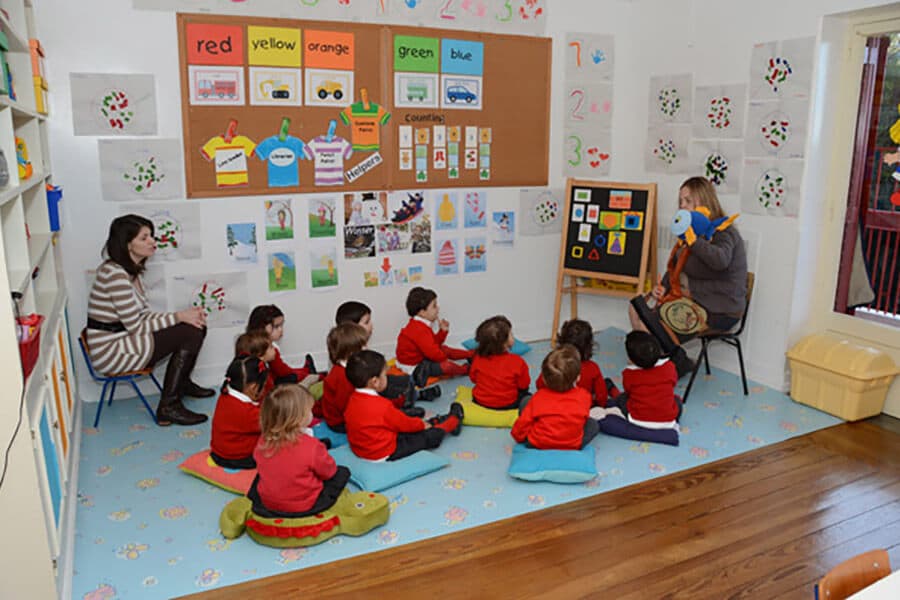
The daycare for children from one to five years old at St. John’s International School Source
5. Nursery and kindergarten at Jill’s Place School
-
Location — Cascais
-
Age of children — 18 months to 5 years
-
Language of study — English
The kindergarten adheres to the Harvard education system and the Reggio Emilia approach. The parenting method is based on the idea that children have uniqueness, an innate ability to absorb knowledge, show creativity and care for others. Educators teach children through active play.
Educational subjects include: Counting, Writing, Reading, Logic, Music, Dancing, Singing, Drawing and painting, Sports, Behaviour, Theatre, Gardening, Cooking, Animal care.
Best kindergartens in Lisbon and Porto
Almost half of the Portuguese live in the largest urban agglomerations of Portugal: Lisbon and Porto. 2.8 million people live in Lisbon, taking into account suburban settlements. 2.2 million live in Porto and its suburbs.
Lisbon, the capital of Portugal, is located on the west coast of the Atlantic Ocean. Here is the country’s largest seaport and Portela International Airport. Most of the nation’s finances, commerce, entertainment, arts, education, and commerce are concentrated in Lisbon.
Porto is a major port and the centre of the industrialised north of the country, which houses the offices of international corporations, such as Bial, Millennium, SONAE, and Galp. The city has preserved historical buildings with baroque and neoclassical architecture. The University of Porto is the second-largest in Portugal.
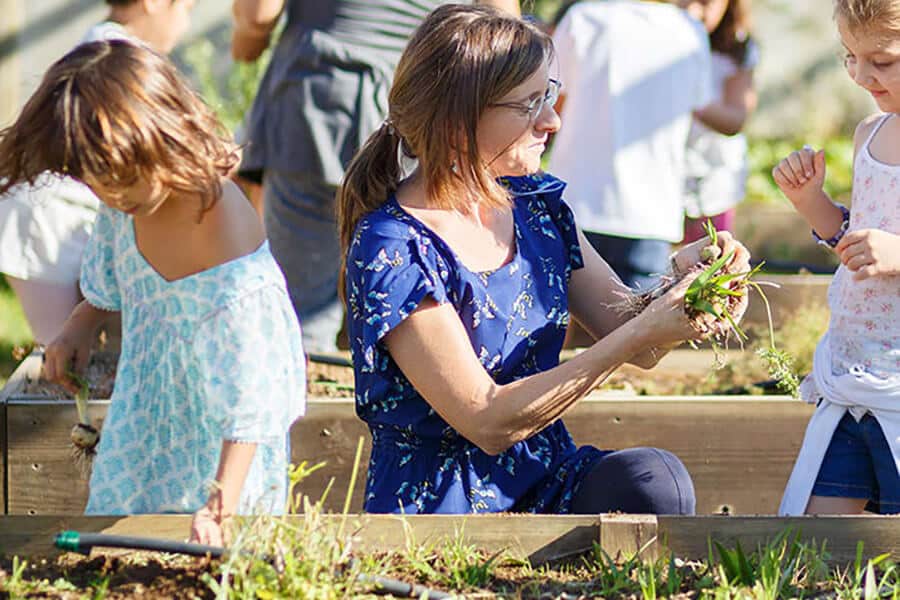
Kindergarten for children aged three to five at Carlucci International School Source
Best kindergartens in Madeira
Madeira is an autonomous region of Portugal in the Atlantic Ocean, in the country’s southwest. The islands are famous for their botanical gardens, beautiful beaches, relic forests, and cliffs. People come here for kitesurfing, windsurfing, and diving.
The economy of the Madeira region develops in the field of tourism, services, construction, and food production. Madeira has a university and several medical clinics. The population density in the area is lower than in mainland Portugal.
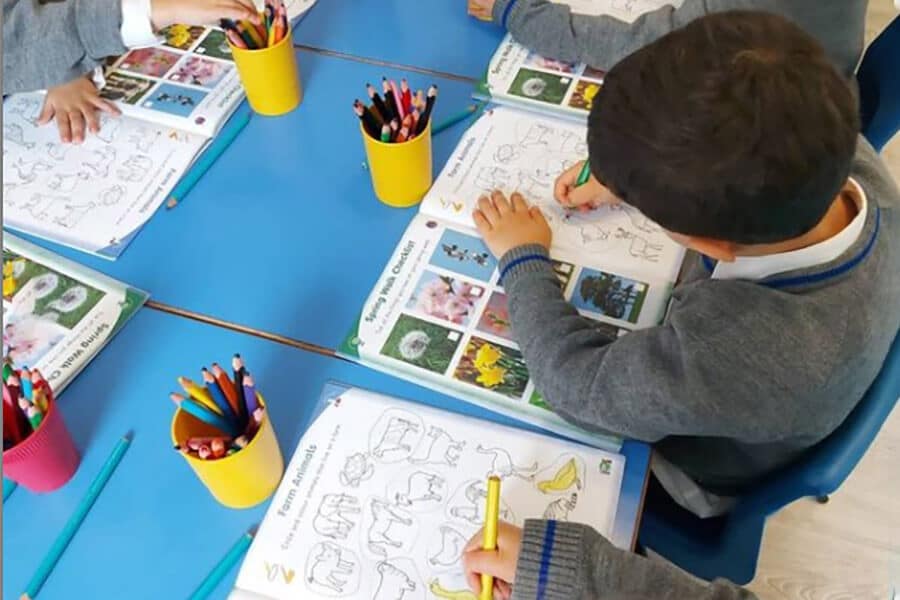
The kindergarten for children from 3 to 5 years old at the International School of Madeira Source
Best kindergartens in the Algarve
The Algarve region is located along the southern coast of the Atlantic Ocean. There are many resorts, hotels and entertainment centres for tourists. The Algarve is famous for its picturesque beaches, blooming gardens, colourful cliffs and low mountains.
The city of Faro, the centre of the Algarve, has an international airport. In addition, a motorway provides quick access from the region to the main Portuguese cities and Spain.
International families live in the Algarve because it has beautiful nature, safety, and access to quality healthcare and education.
Kindergartens at international schools in the Algarve have swimming pools, stadiums, concert studios, gardens and animal kennels. Children play outdoors, participate in sports, and go on excursions to historical places.
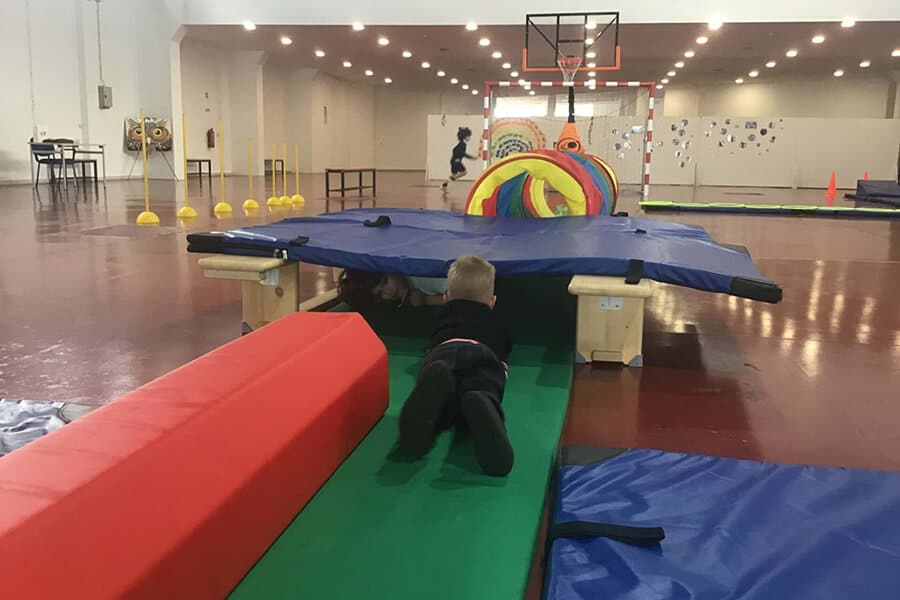
The kindergarten at Eupheus International School for children of 3 to 5 years
The Northern region is Portugal's second most important economic and industrial centre. In addition, there are famous universities and medical clinics. But, unfortunately, it is the coldest region, and it is not suitable for a beach holiday.
The Central region combines proximity to the country's business centre and a variety of natural attractions. The coast is popular with surfers because of the high waves. In addition, the area is home to the country's leading university and a world-famous Parkinson's clinic.
Alentejo is the largest centre of agriculture and winemaking. The region is chosen by those who appreciate nature, silence and ecology. The area has a university and the largest hospital in Portugal. However, beach holidays here are unpopular due to strong winds from the Atlantic.
The Azores is the most undeveloped region of the country with a changeable climate. It has a low population density and poorly developed infrastructure.
The best kindergartens in other regions of Portugal
How to choose childcare
Many nurseries and kindergartens in Portugal thoroughly prepare the child for school. The best daycares are organised at international schools that adhere to educational standards in teaching:
Teachers with higher education work in kindergartens. They create a family atmosphere and can consider the peculiarities and unique characters of children.
Children learn communication skills, literacy, counting, and foreign languages through active play.
Children develop their creative potential from a very young age: they play musical instruments, sing, dance, and participate in theatre performances and concerts.
The best Portuguese kindergartens are equipped with sports stadiums, playgrounds, and concert studios.
The schedule of kindergartens is carefully thought out: children have enough time for sports, studies and free games.
International education is available to residents with a residence permit in Portugal.
Portugal residency can be obtained through participation in the investment program.
The minimum investment amount is €250,000. The applicant can buy real estate or securities, open a deposit, and invest in business, science or culture.
Portugal residency can be obtained through participation in the investment program.
The minimum investment amount is €250,000. The applicant can buy real estate or securities, open a deposit, and invest in business, science or culture.
Residence permits are obtained within 8 to 10 months. An application for a residence permit in Portugal can include a spouse, children under 26 years old, parents over 65 years old or financially dependent on the investor.
The investor will become the "golden visa" owner in a few months. It allows the entire family of the applicant to live and work in the European Union permanently and apply for citizenship in five years.
There is no requirement for permanent residence: it is enough to spend 7 days a year in Portugal.
Immigrant Invest is a licensed agent for citizenship and residence by investment programs in the EU, the Caribbean, Asia, and the Middle East. Take advantage of our global 15-year expertise — schedule a meeting with our investment programs experts.













